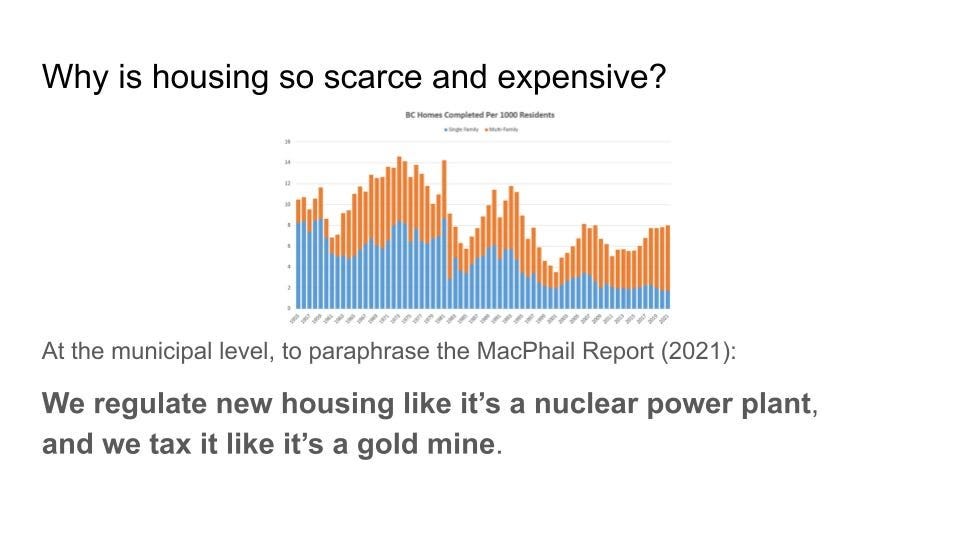On the weekend, I did a one-hour interview with Arman Raina and Akhil Krishnan on CITR, UBC’s radio station. Link.
Of course I wrote up some key points beforehand.
Diagnosis:
Housing in Metro Vancouver is maddeningly scarce and expensive because we have lots of jobs and not enough housing. The result is that younger people are being crushed and driven out by high housing costs. This is a major constraint on economic growth: businesses can't scale up because they can't find enough workers. It's bad even for older homeowners - where are our kids going to live? How's the healthcare system going to work when hospitals can't find nurses?
This is a fixable problem. We have people who want to live and work here, and other people who want to build housing for them. The problem is, at the municipal level we regulate new housing like it's a nuclear power plant, and we tax it like it's a gold mine.
And then when Covid hit five years ago, there was a sudden massive surge in people working from home, needing more space, and willing to move. It's like the housing shortage spilled over from Metro Vancouver and the GTA across the entire country. Our pre-Covid housing stock no longer lines up with where people want to live and work.
What we need to do:
To fix this, we need to push municipalities to make it legal by right to add more density: townhouses, multiplexes, small apartment buildings, high-rises near rapid transit and city centres. Land here is scarce, because of the ocean and the mountains, but it’s also really under-used, because of the extremely slow and labour-intensive approval process.
And we need to keep reducing costs, which act as a floor on prices and rents. In particular, this includes development charges. By piling on costs, we’re driving up the floor on prices and rents to the point where nobody can afford them. There’s a lot of recent stories about unsold condos, because interest rates are higher and so what people can pay is lower. The high cost per square foot of floor space also results in shrinkflation, since apartments have to get smaller so people can buy them.
How long will it take to see a difference? How much can we eventually bring down prices and rents, and what would that look like?
Auckland in New Zealand brought in reforms like this in 2016. We should be able to see a noticeable difference within four or five years.
In terms of how much of a difference it can make, CMHC estimated back in 2018 that if you look at the cost of labour and materials, prices in Metro Vancouver were about one-third higher than they need to be, because of all the constraints we put on building new housing.
Ideally we’d have housing stock that looks more like Montreal’s, with small apartment buildings everywhere. In Montreal it’s common to have a building with one or two flats per floor, so they’re pretty large and family-sized.
More
A shorter version of the argument - Urbanarium debate #17.
The Vancouver Area Neighbours Association - we aim to counterbalance opposition to new housing, to make sure that city council isn’t just hearing from people who fear and oppose new housing.
CMHC report: Supply constraints increased prices of apartment condos in Canadian cities (December 2018). Prices in Vancouver are about one-third higher than the cost to build
How I got into housing politics: I watched a public hearing for a six-storey rental building in July 2019. My reaction was, “Why is this process so broken, and why hasn’t anyone fixed it yet?” Fraser and 23rd.



